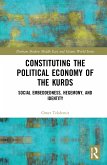The book offers an interdisciplinary qualitative study of the history of policing in Brazil and its colonial underpinnings, providing theoretical accounts of the relationship between biopolitics, space, and race, and post-colonial/decolonial work on the state, violence, and the production of disposable political subjects. Focused empirically on contemporary (1985-2015) police killings and disappearances in favelas, particularly in Rio de Janeiro, the books argues that the invisibility of this phenomenon is the product of a colonial mindset - one that has persisted throughout Brazil's experience of both dictatorship and re-democratisation and is traceable to the legacies of the Portuguese empire and the plantation system implemented. Analysing the development of the police as a colonial mechanism of social control, Villenave shows how the "war on drugs" reproduces this same colonial logic and renders some, overwhelmingly black, lives disposable and thus vulnerable to unchecked police brutality and death. It will be of interest to students and scholars of international politics and also contributes to critical security studies, postcolonial and de-colonial thought, global politics, the politics of Latin America and political geography.
Hinweis: Dieser Artikel kann nur an eine deutsche Lieferadresse ausgeliefert werden.
Hinweis: Dieser Artikel kann nur an eine deutsche Lieferadresse ausgeliefert werden.








